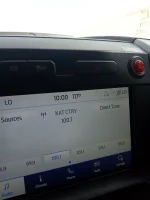This ^^^^^^^^^^^^
All 3 of my vehicles get the best mileage in the heat of Summer. The engine gets up to its optimum operating temperature much faster in the Summer. Cold engines drink fuel.
I’ve never noticed large differences in fuel economy by season. Then again all my ICE vehicles were fairly large. The smallest being the Escape with a 2.5. Mostly Burbs, Yukons, K1500s, Panthers… all got about the same lousy MPG no matter the weather. Now, on the Volt, any type of HVAC ruins my miles per KwH


